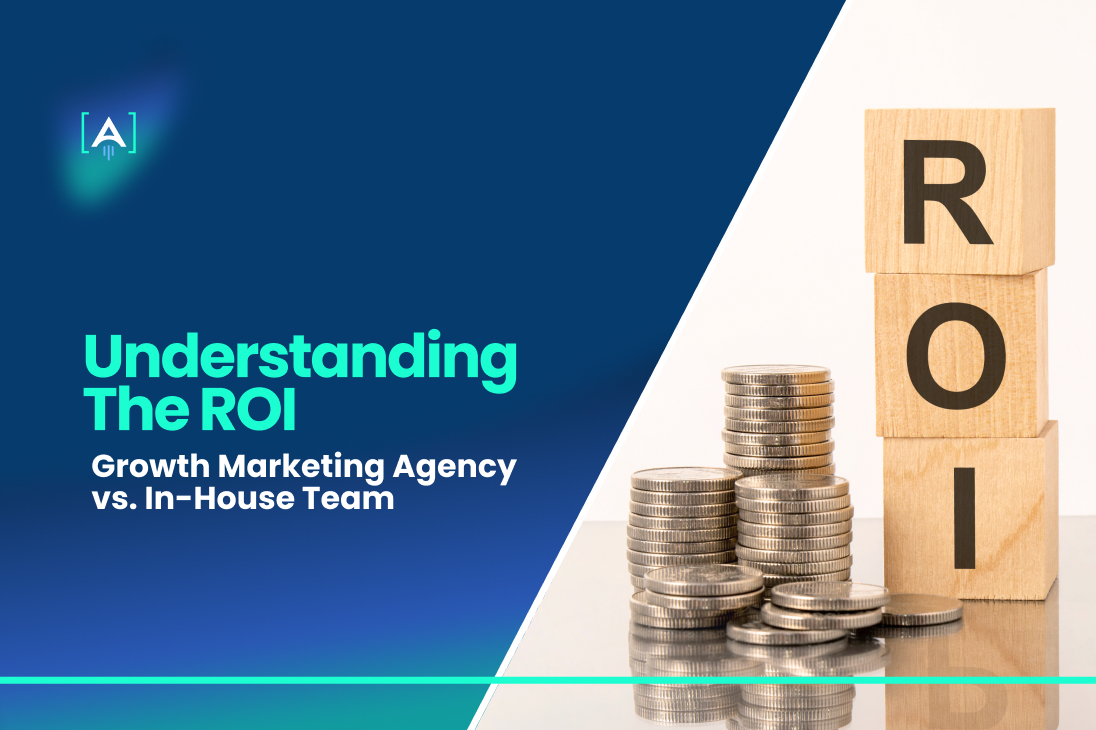As a startup founder, you must understand where your marketing dollars go.
In marketing, the Return on Investment (ROI) guides your decision-making process.
When it comes to achieving optimal ROI, you may wonder, “Do I call in the in-house marketing vs. agency?”
Read this blog post to decide which leads to your startup growth.
Understanding ROI in Marketing

ROI directly measures how well your startup strategies and investments are performing.
It’s the answer to the key question: Is what you’re putting into your startup marketing initiatives returning as tangible growth for your startup?
Which one will bring you the most out of your investments? Considerations are in-house marketing vs. agency. Or maybe an agency vs freelancer?
Suppose you invest in a paid advertising campaign on social media.
You spend a certain amount on ads, aiming to boost sales. To calculate ROI, you compare the revenue generated from the campaign against the money spent.
For instance, if you paid $500 on ads and gained $2,000 in revenue, your ROI is ($2,000 – $500) / $500 * 100, giving you a 300% ROI.
The Importance of ROI in Marketing Decisions:
- Success Indicator: ROI is your business report card. It shows if your marketing strategies work.
- Smart Spending: It keeps your spending in check. Knowing your ROI ensures you’re not throwing money into strategies that don’t bring value.
- Strategic Choices: Say you try two marketing tactics – social media ads and email campaigns. ROI helps you see which brings more sales so you know where to focus.
- Adapt Quickly: If a strategy isn’t making money, ROI signals to pivot. No wasted time or resources – adapt and move forward.
Factors Affecting Marketing ROI
Ensuring a consistent ROI can be tricky, especially for startups.
Let’s explore the key factors shaping your ROI.
Resource Allocation: Your investment isn’t just about money. It’s about where you put your cash, how much time you devote, and who’s on your team. Each of these factors shapes the potential returns.
Expertise and Know-How: Having a team that understands the nuances of marketing can supercharge your ROI. A skilled team crafts campaigns that resonate, driving higher returns.
Strategy Precision: How sharp and targeted your plan is affects ROI. A well-aimed strategy hits the bullseye, maximizing returns compared to scattered efforts. The precision of your strategy is the secret sauce for ROI success.
Consistency Counts: Regular and consistent efforts can build momentum for better ROI. Continuous marketing efforts keep your brand on the radar, yielding long-term, reliable returns.
Choosing the Right Channels: Social media marketing? Email blasts? Podcasts? Experiment, track results, and double down on what works. Remember, sometimes, the most incredible new platform might not be where your audience lives.
Choosing the Right Partner: Deciding between in-house marketing vs. agency can significantly impact your ROI. In-house teams offer more control and intimate knowledge of your brand, while agencies bring a wealth of experience and external perspectives. Each option has benefits, and the right choice depends on your needs and resources. And then comes how to choose a digital marketing agency.
Adaptability to Trends: Adapting to new trends ensures your strategies remain effective, riding the wave of what’s resonating with your audience.
The Growth Marketing Agency Approach

Now, let’s break down a growth marketing agency approach to ROI in the in-house marketing vs. agency battle.
Overview of Growth Marketing Agencies
Growth Marketing Agencies help startups grow by applying tailored marketing strategies.
Beyond just creating ads, a growth marketing team develops strategies to propel your brand.
Armed with diverse skills, high-tech tools, and a growth mindset, they aim to elevate your entire brand presence.
The goal of growth marketing agencies is to get results. So, they’re constantly refining innovative marketing strategies to ensure you’re growing smart.
Before the marketing agency onboarding process, you must know that many growth marketing agencies deliver these digital marketing services:
- Search Engine Optimization (SEO): Promoting your visibility on search engines, ensuring your brand shines when potential customers are looking.
- Content Marketing: Creating relevant content for startups that tells your story and attracts, informs, and converts your audience.
- Social Media Management: Mastering the art of social platforms and creating a vibrant online presence.
- Paid Advertising: Organizing targeted and cost-effective advertising campaigns to reach specific demographics and maximize conversion opportunities.
- Email Marketing: Nurturing relationships with your audience through personalized marketing and impactful email campaigns, turning leads into loyal customers.
- Data Analytics and Reporting: Using data to track performance, measure success, and continually refine strategies for optimal results.
- Conversion Rate Optimization (CRO): Improving your digital channels to ensure that every interaction has the potential to convert.
- Marketing Automation: Implementing automated processes to manage repetitive tasks, ensuring efficiency in marketing efforts.
- Web Development and Design: Creating user-friendly, visually appealing websites that attract and guide visitors toward conversion.
- Strategic Planning and Consultation: Developing comprehensive strategies aligned with your business goals and adapting them.
What Is an ROI Marketing Agency?
If you’ve ever wondered, “What is an ROI marketing agency?”- it’s a data-driven partner that prioritizes results, ensuring your marketing budget generates tangible business outcomes.
An ROI marketing agency focuses on strategies that deliver measurable returns. Instead of just running ads or creating content, they ensure every marketing effort drives growth and profitability.
These agencies use data-driven tactics to maximize revenue while minimizing costs. Their goal is to help businesses invest wisely in marketing, ensuring every dollar spent brings value.
ROI Advantages of Hiring an Agency
Given all the benefits and functions of a growth marketing agency for startups, you may have questions to ask a growth agency, such as:
“Will they maximize my ROI?”
Let’s find out:
Hiring a marketing agency ensures a turbo-boost for your startup’s success.
Due to their deep understanding of digital marketing strategies, your marketing efforts precisely hit the bullseye.
They transform your visibility into robust growth.
One of the strongest points of growth agencies is their skilled teams, including a growth marketing consultant, a growth marketing manager, a designer, a content writer, etc.
Some excel in creating engaging content, others analyze data, and some are social media experts.
Together, they form a cohesive unit, ensuring your brand reaches your target audience effectively, using growth marketing solutions.
Advanced tools help the team operate smoother, faster, and more effectively.
Cost Analysis
Hiring a growth agency is an investment in the context of ROI.
These agencies offer growth marketing consultancy, flexible pricing models that adapt to your budget.
The typical costs of hiring an agency include:
Service Fees: This can be a monthly retainer, a fixed project fee, or hourly rates, depending on the nature of the services required.
Project-Based Costs: Growth agencies may charge a one-time project fee if your startup has specific projects or campaigns. This model suits businesses with defined, short-term goals or specific marketing initiatives.
Performance-Based Pricing: Some agencies tie their compensation directly to the performance of the campaigns. This could involve a percentage of sales generated, leads acquired, or another predefined key performance indicator (KPI).
Hourly Rates: For smaller or ad-hoc tasks, agencies charge hourly rates. This allows flexibility for startups with periodic needs.
Resource Allocation Fees: This could include the expertise of individual team members, the use of specialized tools, or other resources dedicated specifically to your marketing campaign.
Ad Spend: If your digital marketing strategy involves paid advertising, a portion of your budget will go directly to ad spending on platforms like Google Ads. This is separate from the agency’s fees and is typically managed transparently.
Setup Fees: These include initiating a new campaign or implementing specific tools. These fees cover the initial groundwork for your startup’s unique needs.
Consultation Fees: Initial consultations or business growth strategy sessions may have associated fees. This is common for in-depth discussions where the agency invests time in understanding your business, goals, and challenges.
The In-House Team Approach

Now, let’s discuss building an in-house marketing team and how it can contribute to higher ROI.
You need to take these steps to build and maintain an internal marketing team:
- Finding Your Teammates: It starts by recruiting skilled individuals. These experts become the creators of your brand’s narrative, ensuring that every piece of content and campaign aligns with your business goals.
- Training Camp: Next, you must equip your team with essential marketing tools. Invest in training programs to sharpen their skills and keep them updated.
- Team Bonding: Team-building activities help foster a collaborative environment and a positive work culture. Plus, they evoke unity in team members to tackle marketing challenges with collective strength.
- Strategize and Execute: Your team should develop a robust marketing strategy or follow your plan.
- Allocate Resources Wisely: Ensure your team has the budget and time needed. It’s about investing smartly in areas that will have the most significant impact on your startup.
- Long-Term Commitment: It’s a long-term investment in the growth of your startup. Understand the cumulative impact of consistent, dedicated marketing efforts over time.
ROI Considerations for In-House Teams
How can an in-house marketing team ensure a positive ROI for startups?
Long-Term Investment Perspective: Building an internal marketing team is something you invest in long-term. While initial costs are higher, think of it as sowing seeds for continuous growth. Over time, your in-house marketing department may pay dividends.
Team Development: Your startup needs a reliable force. So, you have to invest in your team members’ expertise. Over time, they can adapt to evolving marketing and contribute to your startup’s success.
Arming with Technology: Team development continues by providing the right tools – from analytics platforms to social media management tools.
Resource Allocation Wisdom: You control where your budget goes, focusing on areas for your brand’s growth. This hands-on approach ensures that every dollar invested directly influences your marketing strategies.
Direct Control and Decision-Making: Having an in-house marketing team means having direct control over decision-making. This allows you to adjust strategies quickly.
Marketing Data: The in-house marketing department has direct access to and ownership of your marketing data. This empowers them to glean actionable insights, contributing to more innovative, data-driven decisions that fuel your marketing campaigns’ overall efficiency and success.
Dedication to Your Mission: Your in-house marketing team is deeply dedicated to your startup’s mission. This intrinsic motivation results in a higher level of commitment, translating into marketing efforts that go beyond tasks – they contribute to realizing your brand’s vision.
Cost Analysis of In-House Teams
Here are the key considerations:
- Initial Setup Costs include recruitment costs, onboarding processes, and potentially setting up dedicated office space.
- Salary and Benefits include competitive salaries, health benefits, and other perks. The average salary of a digital marketing manager in the US is $106,244 – $140,575 annually.
- Training and Development: Keeping your in-house team up-to-date on the latest marketing trends is essential. Allocating resources for training programs ensures your team has the knowledge and expertise for effective marketing strategies.
- Technology and Tools: Investing in the right marketing technologies and tools is critical to your in-house team’s efficiency.
- Operational Overheads: These involve utilities, office supplies, and other day-to-day expenses. While these may seem minor individually, they contribute to the overall operational overhead of maintaining a functioning team.
Comparative Analysis

Let’s break down the pros and cons of in-house marketing vs. agency, so you can pick the best fit for your startup.
Expertise and Specialization
Agencies excel with diverse skills. Reputable agencies have established methodologies and a successful history in driving growth for various businesses. This can benefit startups seeking immediate results and actionable strategies.
While agencies can adapt to your brand, they may need more intimate knowledge and emotional connection that an in-house team develops over time.
In-house teams bring an inherent understanding but may need broader insights from external experiences.
Flexibility and Scalability
Agencies stand out for adaptability and swift scalability, quickly adjusting to dynamic demands. They can quickly scale their team up or down to match your needs.
Hiring and training staff requires careful planning, making rapid scaling a challenge.
But, once built, an in-house team becomes an extension of your company, readily adjusting strategies and workflows as your needs evolve.
Time to Market and Agility
Growth marketers are pre-equipped with expertise and established processes.
They are adept at rapid execution, significantly expediting a startup’s time to market and leveraging their agility as a competitive advantage.
While in-house teams might not immediately hit top speed, deeper brand understanding and close collaboration foster agility in the long run.
They can quickly adapt campaigns to market feedback and pivot strategies seamlessly due to their intimate knowledge of your company.
Making the Right Choice for Your Startup

There’s no winner in the in-house marketing vs. agency dilemma.
Ultimately, you need to consider several factors before choosing one:
Assessing Your Startup’s Needs
Start by understanding your startup’s unique needs.
Consider the scale of your operations, the urgency for quick results, and the required expertise level.
Evaluating marketing agency vs. in-house, consider an agency’s flexibility or an in-house team’s internal connection better suits your current situation.
Guide on how to assess:
The Scale of Operations
If your startup rapidly expands, an agency might offer the scalability needed for quick adjustments.
For a more steady growth pace, an in-house team could align better.
Urgency for Quick Results
If speed is of the essence, growth agencies are designed for rapid execution.
An in-house team might suffice if a steadier pace aligns with your goals.
Level of Expertise Required
Agencies bring diverse expertise from various projects.
In-house teams deeply understand the intricacies of your brand.
Budget Considerations
Agencies may have initial costs, but they can save time.
In-house teams might need more upfront investment, but it could be cost-effective over time.
Questions to Consider
Considering these questions, you can better understand marketing agency vs. in-house dilemma, tailor your choice to match your startup’s unique needs and pave the way for sustainable growth:
- What is the urgency for achieving marketing results?
- How adaptable is our marketing strategy need to be to cope with changes in the market?
- What is the current size and scale of our operations?
- Do we require a diverse set of marketing skills and expertise?
- How crucial is an in-depth understanding of our brand and industry for effective marketing?
- What is our marketing budget allocation?
- Do we aim for immediate ROI, or are we willing to invest for long-term gains?
- How quickly do we need to scale our marketing efforts?
- What level of control do we want over our marketing campaigns?
- How comfortable are we with external collaborators managing critical aspects of our marketing strategy?
Keeping the Balance

Choosing between a marketing agency vs. in-house is a balancing act.
If, after assessing your needs, you lean towards the agility of a growth marketing agency, consider Azarian Growth Agency as your go-to partner.
Our track record in data-driven and tailored strategies, adaptability, and proven results align with startup growth ambitions.
Connect for a Business Consultation or Detailed ROI Analysis!

